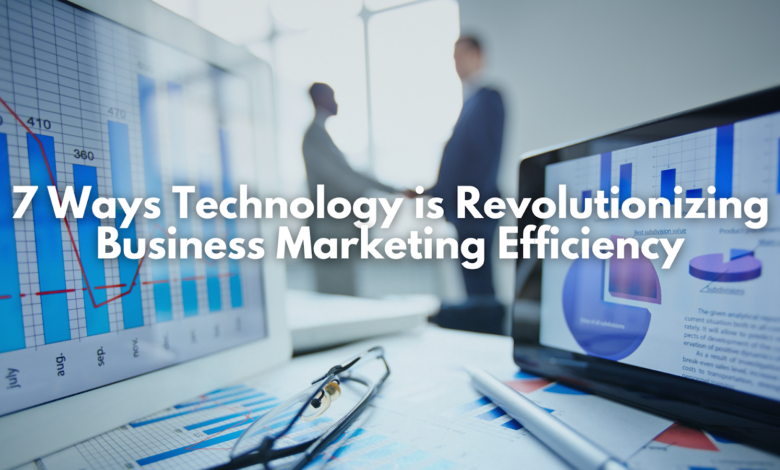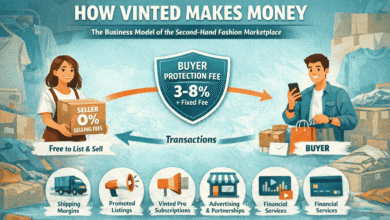7 Ways Technology is Revolutionizing Business Marketing Efficiency

Gone are the days of guesswork in marketing. What today’s landscape demands are precision, speed, and agility. The basic resource that businesses are making to achieve these is cutting-edge technology. Right from automation to artificial intelligence, technology is leveling up marketing strategies, giving business companies the leverage to make the right decisions at the right time, reach targeted audiences, and achieve higher returns on investment.
Here are seven ways in which technology is transforming business marketing efficiency, and helping brands emerge on top.
1. Enhanced Data Analytics for Customer Insights
Data in the digital age is king. High-data analytics helps marketers leverage customer data to gain insights into their decisions. The analytics platform allows businesses to know how consumers behave, track areas of value, and tailor messages accordingly. A data-driven approach not only saves time but also makes marketing more effective.
According to studies, companies using data analytics have a 20% rise in marketing ROI. One of the emerging data strategies is A/B testing. A/B testing leverages customer data to optimize email marketing efforts.
Using A/B testing in cold email campaigns involves comparing two variations of an email to determine which one performs better in terms of open rates, click-through rates, or other desired outcomes. Instead of relying on guesswork, A/B testing provides concrete evidence of what works, making marketing strategies more targeted, efficient, and ultimately more effective.
2. Automation of Repetitive Marketing Tasks
Repetitive tasks like email verification, lead scoring, and customer segmentation are changed through automation, transforming how businesses operate. By automatically doing things that would otherwise take up too much time on these processes, marketers can then focus on strategy rather than getting bogged down in manual operations.
Cold email marketing allows a business to send scheduled emails and organize similar campaigns with minimal interruptions, even keeping records of responses received. Automated follow-ups and drip campaigns allow companies to influence customers without taking hours to spend time on different interactions.
Automation ensures better email deliverability by optimizing the timing and frequency. Automation tools can ensure emails are sent when recipients are most likely to open them, maximizing engagement rates and reducing the likelihood of being marked as spam.
3. AI-Powered Personalization in Customer Experience
Artificial intelligence has taken customer personalization to a new level. Customer data goes through AI algorithms and can be delivered in hyper-targeted experiences, thus increasing the yield of customer satisfaction and loyalty. Personalization is crucial in modern marketing, where today’s customers want brands to understand their preferences and seek to anticipate their needs.
In a study, MINDSPRINT tailored recommendations based on customer behavior and preferences, leading to a 30% increase in conversion rates. Customers were significantly more inclined to make purchases when they saw products specifically aligned with their interests. In email marketing, AI algorithms can customize their subject lines, offers, and timing to improve cold campaigns by specifically relating to recipients’ preferences and past behavior.
4. Programmatic Advertising and Real-Time Bidding
Programmatic advertising uses AI and machine learning to automate the buying of digital ad space, making the ad-buying process faster and more cost-effective. It ensures that the right audience sees ads in real-time, making the process faster and more cost-effective.
It allows marketers to spend more time on A/B testing and campaign optimization and not do ad placements themselves. According to eMarketer, programmatic advertising comprises over 90% of U.S. digital display advertising. These programmatic ads streamline marketing by automating procedures that, previously, entailed much human oversight and now bring better returns on ad spending and save time.
5. Real-time engagement with AI chatbots
AI chatbots changed the face of customer support and engagement. It is very helpful in answering, guiding people through the purchasing process, and providing insight to understand the needs of a customer. Continuous support always brings satisfaction and helps free more human resources for complex tasks.
The chatbot market is predicted to grow from US$ 696.4 million in 2023 to US$ 4.9 billion in 2033. Companies like Sephora have many chatbots simply to suggest product recommendations, research what the customer is inquiring about, and even book appointments with a very streamlined process that feels personal but in reality, runs on automation.
6. Generative AI in Content Creation
Generative AI changes the game for content creation. Marketers can use AI to write ad copy, social media posts, and even blog articles in such a way that they can produce more content faster and at an exponentially larger scale. It makes extensive A/B testing possible because AI can create numerous variations of an email subject line or ad copy so that identifying what best resonates with audiences becomes easier.
Generative AI can use customer data to create various kinds of personalized cold email sequences in email marketing. Tools that serve content variations, like Jasper AI, allow marketers to have many options and quickly optimize messaging. Testing multiple copies at the same time will ensure companies find the right message for each segment.
For businesses, the benefit here is clear: AI-generated content simply reduces the time and cost of the creation of content while allowing for rapid iteration and personalization.
7. Automation of Social Media and Influencer Marketing
Social media marketing has gotten more complex as firms have had to deal with multiple platforms requiring managing posts, engagement, and analytics across those platforms. Technology helps ease the management and optimization of social media marketing this includes scheduling posts and identifying the influence of high-impact influencers.
Some tools like Hootsuite, and Sprout Social, automate social media posting. These help marketers to be consistent and revisit their followers now and then. Influencer marketing platforms, like HypeAuditor, help businesses pick up influencers that they can associate with: “HypeAuditor is a modern influencer marketing platform that helps companies identify the most valuable influencers in line with their brand.”.
However, analytics tools also reveal what types of content and engagement patterns work well. That helps refine the strategy when launching targeted cold email marketing campaigns in tandem with social media promotions.
Conclusion
Technology is at the heart of modern marketing, offering businesses an array of tools to improve efficiency and maximize results. From sophisticated analytics of big data to AI-based personalization, from programmatic advertising to chatbots, technology is changing the course of how businesses develop and execute marketing approaches with precision and agility.
In a competitive landscape, the difference between average campaigns and highly successful ones lies in these tools. Thus, with changing technology, businesses have to adapt and stay ahead of the trends by embracing innovations, such as A/B testing in cold email campaigns, AI content generation, or email verification, to churn out better results. Investing in these technologies can transform the way marketing is done, help the customers engage better, and boost their bottom line in the end.
It provides a solid base using such tools, allowing businesses to build campaigns that not only reach but resonate and ignite meaningful interactions with the constantly shifting demands of digital marketing.
FAQs
1. How do data analytics improve the ROI of marketing and optimize cold email campaigns?
Data analytics helps marketers gain an in-depth understanding of how customers behave and therefore refine targeting and message personalization. Businesses can optimize A/B testing when conducting cold email campaigns by analyzing open rates and click-through rates, which helps drive higher engagement and conversion.
2. What role does email verification play in improving email marketing efficiency?
Email verification is a way that prove such delivery because it sends emails to truly active, valid email addresses. That helps improve email deliverability, helps protect a brand’s reputation, and, as a consequence, campaign performance.
3. In what ways can automation tools decrease marketing costs without compromising personalization?
One thing marketing automation solutions do is automate repeated cycles – such as email and social media campaigns – to allow teams to focus more on strategy when executing, thereby offering personalized messaging at scale without sacrificing efficiency.




